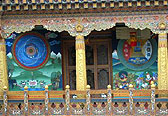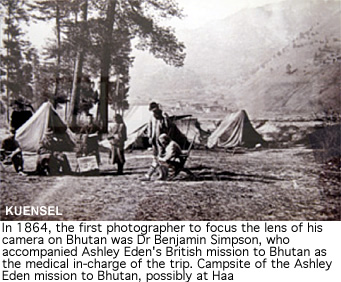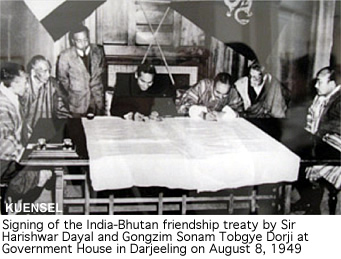 |
Bhutan History |
|
 |
Bhutan Information |
|
|
 |
|
Deb Nagpo - The Black Regent
|
"The only powerful Deb Raja who reigned for many years was Jigme Namgue [Jigme Namyal], who, as Ponlop of Tongsa, was so hostile to the British Mission of 1864."i This quote is an extract from a reportiiissued by the branch of the British Intelligence.
Jigme Namgyal (r.1870-1873) as the 49th Regent he repaired the Thimphu Dzong that had been damaged by fire. But, his tenure was marked by many revolts all of which he managed to quell. The British were intrigued by him and kept him on their radar.
The British Intelligence compiled a 156-page report in 1906 titled A Short Military Report on Bhutan. This report is an important primary source of history for that period and also provides some details on the father of the first king. So far most of the stories on Jigme Namgyal have been written recently and since most of it has been based on oral sources and there are some discrepancies in the accounts .
The British report is detailed and contains dates and names. The report itself has been divided into several chapters ranging from history, system of government to administration.
Chapter VII, devoted to history states that Jigme Namgyal retired in 1873.But according to the report it was only in theory as he continued to decide everything of importance so his retirement was rather nominal. The country saw six more Regents before his son was enthroned as the first monarch in 1907.
According to the report, Jigme Namgyal's brother, Gantem Namgue, succeeded him. As the 50th Regent, Gantem visited India in 1875. He travelled down to Buxa to meet the Lieutenant-Governor of Bengal and in doing so, became the first Regent not only to enter British India but also to meet a British of that rank. Bhutanese accounts differ on the succession.iii
The Civil War
Another contention is on dates of the Civil War. The Bhutanese historian Lopen Nado states it to have taken place in 1872ivbut the British say 1877.
The British report provides another perspective. According to it, the two chiefs of the defeated party, the Paro Penlop and the Punakha Dzongpon, with a few followers, took refuge in British territory.
The report states the two leaders were disarmed on arrival at Buxa. It mentions the party arrived in a state of destitute and received compassionate grants in cash and some land for cultivation from the Government, on condition of their abstaining from intrigues in Bhutan. However, the Regent of Bhutan asked for their surrender, which was refused by the British, as they were merely political offenders, and the treaty did not allow of it.
The defeated party settled in the Darjeeling hills and lived there for nearly two years. When the political affairs changed, they returned to Bhutan but one of the chiefs died in exile.
One puppet Regent was Shujah Jani (alias Shujah Namgue) and according to the British report he ruled until June 1880. School textbooks say he ruled until 1882. The British report states the Regent was ill for three months before he passed away. According to the report, the Dzongpon of Punakha immediately, put forward a relative named Lamchen, another local lord for the throne, but Jigme Namgyal, distrusting this candidate, again came forward and succeeded in securing his own re-election as the Regent.
"He seems to have been unwilling to discharge the ordinary duties of the Deb Raja, but determined to be the real temporal sovereign in all matters of importance, and so, whenever he was unable to secure the election of a candidate who would be in his hands, Jigme Namgue reigned in person."
There is a consensus on the death of Jigme Namgyal. The report confirms, "He fell in July 1881 when riding yak, and died from the effects, on which Lamchen, then, about 45 years of age, succeeded him."
By the end of 1906 when the British report was published, Bhutan had already enjoyed over 20 years of settled government and freedom from internecine struggles. The report credits Jigme Namgyal for it. It says he had gradually established the ascendancy of his family over others and had seated it firmly in the Penlopship of Tongsa. Ugyen Wangchuck had become the Trongsa Penlop and had control of affairs. He further consolidated his power more or less by peaceful methods and succeeding in filling almost the entire council with either relatives or men wholly devoted to his interest and in doing so completed the work commenced by his father.
The report mention that Ugyen Wangchuck, "is virtually at the present moment ruler of Bhutan. Probably the Paro Penlop is the only man who is not entirely devoted to him, and is doubtful if he has much real influence. He is allowed to remain unmolested in his Penlopship owing to some service he rendered Sir Ugyen in his quarrel with Aloo Dorzi in 1885".v
The report, archived in the British Library, even refers to Jigme Namgyal by his nickname as the Deb Nagbo or the Black Regent.
Footnotes
i L/MIL/17/12/55, India Office Library, British Library, A Short Military Report on Bhutan issued by the Intelligence Branch of the Quarter Master General's Department Simla, Printed at the Government Monotype Office-1906, Chapter VII, History, p.94
ii The property of the Government of India. Issued by the Intelligence Branch Q.M.G's Department. Political & Secret Department, Confidential (need not appear in annual returns.) Not to be used or quoted in any but confidential communications.
iii School history books state that Kitsphelp Dorji Namgyal the brother of Jigme Namgyal succeeds him. Another prominent local historian, Lopen Nado in his work attests this information.
iv "In 1872, the Paro Ponlop Tsewang Norbu turned traitor against him so he sent the Gongzim Kitselpa, the Thimphu Dzongpon Kawang Mangkel Gedun Tsewang and Topa Chushing to deal with him. After that Kawang Mangkel wanted to become the Paro Ponlop but was killed by Topa Chushing who had been ordered to do so by Kitselpa and Gedun Tsewang. So Tsewang Norbu became the Paro Ponlop again. Later the PunakhaDzongpon and Shenga Tamcho Rinchen turned traitor against Jigme Namgyal but they too were defeated. " (Lopen Nado-A Short History of Bhutan, Translated by Lobpon Yeshey Wangdi and Michael Aris.)
v A Short Military Report on Bhutan issued by the Intelligence Branch of the Quarter Master General's Department Simla, Printed at the Government Monotype Office-1906, Chapter VII, History, p.98,

|
| By
Tshering Tashi , Kuensel, Bhutan's National Newspaper 2012 |
| Information on Bhutan |
 |
|





